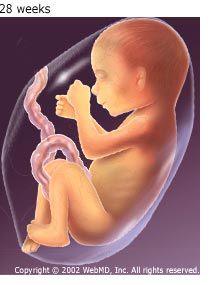Week 26
Baby: Your baby's hearing is fully developed. As the baby reacts to sounds, its pulse increases.Your baby will even move in rhythm to music. Lungs are still growing but are not yet mature. Patterns of your baby's brain waves appear like a full-term newborn. He or she also has patterns of sleeping and waking.
Mom-to-be: The baby's constant movements should be reassuring. You'll be putting on weight at the rate of about 1 pound per week now. You may be feeling some rib pain as your baby grows and pushes upward on your rib cage. The pressure may also be causing indigestion and heartburn. You may also feel stitch-like pains down the sides of your abdomen as your uterine muscle stretches.
Tip of the Week: If you're planning to return to work, you might want to begin checking out child care in your area. Nannies cost about $250 to $600 per week, group day care typically ranges from $125 to $200 per week, and home day care runs from about $75 to $125 per week. Stay open-minded about various child care arrangements.
Week 27
Baby: Your baby's hands are active. Thumb-sucking calms the baby and strengthens cheek and jaw muscles. Your baby can cry now.
Mom-to-be: You may see stretch marks as your uterus continues to expand. Most women have gained about 16 to 22 pounds by now. Your balance and mobility also may be changing as you grow larger.
Tip of the Week: During your last trimester, you should talk to your doctor or midwife about the delivery. They can let you know about signs to predict labor and how far apart the contractions should be before going to the hospital or birth center. It's also the time to begin interviewing pediatricians and to take care of other logistics, like pre-registration at the place where you'll give birth and a birthing plan, which is what you envision your labor and delivery will be like, if you plan to do one. This plan should be written in your patient record or attached to it in the form of a birth plan.
Week 28
Baby: Your baby measures about 10 inches from crown to rump, or a total length of about 15.75 inches from head to toe, and weighs about 2.4 pounds. Brain waves show rapid eye movement (REM) sleep, which means your baby may be dreaming. Eyelids are opening. Branches of lungs are developing.
Mom-to-be: Your uterus extends well above your navel. As the baby gets bigger and stronger this month, you may be experiencing leg cramps and mild swelling of ankles and feet, difficulty sleeping, shortness of breath, lower abdominal achiness, clumsiness, or scattered Braxton Hicks contractions (hardening and relaxing of the uterus, like a rehearsal for labor). You may also be urinating more frequently again as the uterus continues to push on your bladder.
Tip of the Week: Even if your partner is planning on being with you in the delivery room, you might want to consider hiring a doula -- a professional labor assistant who provides support, but not medical aid, for the mother and her partner. Studies show that doulas can shorten a woman's labor and reduce the likelihood of needing pain medication, forceps or vacuum deliveries, or a cesarean section.
Week 29
Baby: Yourbaby's eyes are almost always blue and can distinguish bright sunlight or artificial light through the uterine wall. The baby is performing fewer acrobatics as conditions in the womb become more cramped, but he's still doing a lot of kicking and stretching.
Mom-to-be: You've probably gained 19-25 pounds. You still have some time to go, so you may want to remind yourself of signs of premature labor, including menstrual-like cramps or lower back pain, a trickle of amniotic fluid, or a watery pinkish or brownish discharge preceded sometimes by the passage of a thick, gelatinous mucus plug. Tell your health care provider ASAP if that happens -- they can sometimes stop labor from progressing with bed rest, medications, and possibly also hospitalization.
Tip of the Week: Your blood pressure typically may rise a little around the seventh month. Tell your health care provider if you get severe headaches; blurred vision; severe swelling of hands, feet, or ankles; or if you gain a lot of weight. These symptoms could signal the beginning of preeclampsia, a dangerous condition marked by high blood pressure and high levels of protein in the urine during pregnancy.
Week 30
Baby: Your baby measures about 17 inches from head to toe and weighs about 3 pounds. Baby is growing plumper and beginning to control its own body temperature. Eyebrows and eyelashes are fully developed, and hair on the head is getting thicker. Head and body are now proportioned like a newborn's. Hands are now fully formed and fingernails are growing.
Mom-to-be: Your uterus is about 4 inches above your navel, and it may be hard to believe you still have about 10 weeks to go as the baby continues to push on your ribs. You may be feeling more discomfort in your pelvis and abdomen. You'll probably be gaining about a pound a week.
Tip of the Week: The membranes around the baby that contain the amniotic fluid are called the bag of water. They usually do not break until just before the onset of labor, but if they break prematurely, an infection becomes more likely, so call your health care provider immediately.
What's Happening Inside You?
Your baby changes position frequently and responds to stimuli, including sound, pain, and light. At the end of the seventh month, fat begins to be deposited on your baby.

The amniotic fluid begins to diminish.








.jfif)
.jpg)




.jpg)

